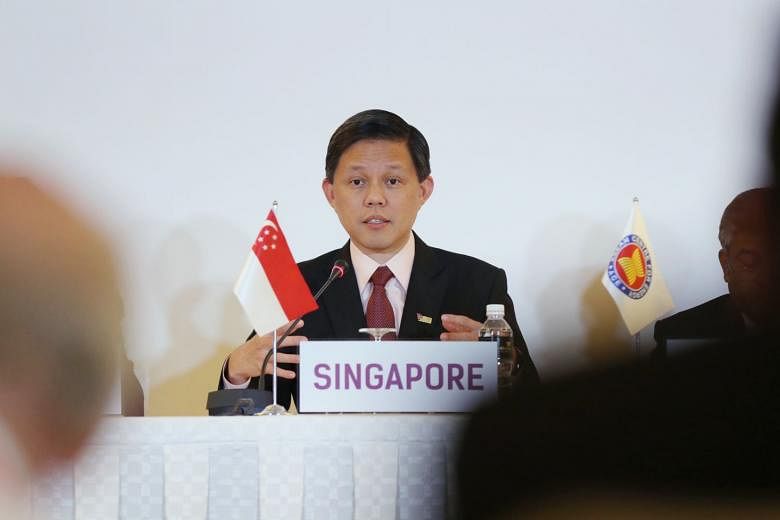SINGAPORE - If the past 50 years have been about how Singapore has overcome water scarcity, the next 50 will be about how the country overcomes its energy challenges.
"Just like how Singapore has successfully diversified our supply of water over the years, our next ambitious goal is to enhance our energy resilience to ensure that we are never dependent on any single source of supply," said Minister for Trade and Industry Chan Chun Sing on Tuesday (Oct 30) at the opening of Singapore International Energy Week at Marina Bay Sands.
To this end, the country is investing in infrastructure, tapping green energy and acting as a test-bed for innovative solutions here and abroad.
He announced new projects and initiatives ranging from ramped-up solar production to greater support for the energy storage systems - essentially gigantic rechargeable batteries - that will enable Singapore to better use solar production.
The Energy Market Authority (EMA) will drive the development of energy storage systems, which is crucial for Singapore's success in harnessing renewable energy.
Solar power is the most promising renewable source for the country, but a major drawback lies in unpredictable sunshine due to cloud cover.
Despite this, a study showed that by 2025 solar power could support about a quarter of national projected peak electricity demand. Today, solar energy accounts for about 2 per cent of the country's power supply.
EMA therefore announced on Tuesday two partnerships with PSA Corporation and Sembcorp Industries to help roll out energy storage systems on a commercial scale.
The authority also launched a policy paper that it said would continuously evolve as the local energy storage systems landscape develops.
This will support the $17.8 million in grants announced at the 2017 energy week that went into testing which storage solutions would work best in Singapore's hot and humid climate.
An EMA spokesman said: "We see energy storage systems as an essential technology to enabling higher levels of solar power adoption in Singapore. We encourage industry to invest in these solutions to optimise their energy use and provide new solutions and business models to our market."
Leading the push for solar energy, JTC will expand its solar generation capacity by 100 times through its SolarRoof and SolarLand initiatives.
From a total installed capacity of 1 megawatt-peak (MWp) today - enough power for 250 four-room Housing Board flats for a year - the government agency aims to achieve 100MWp by 2030.
JTC's SolarRoof programme allows power to be pumped into the national grid from solar panels on the rooftops of the agency's buildings. It lets consumers buy this electricity even if the buildings they occupy are not equipped with solar panels.
SolarLand installs solar panels on vacant land as an interim use.
Mr Chan said: "Overcoming the energy challenge will be our next big audacious goal for the next 50 years."
He added: "As the energy sector undergoes transformation, all of us - consumers, companies and countries - stand to gain from the deployment of new technologies. With better production, management and consumption of energy, we can ensure a high quality of life and a vibrant economy for our people through greater access to cleaner, more affordable and more reliable energy."
Correction note: This article has been edited for clarity.


